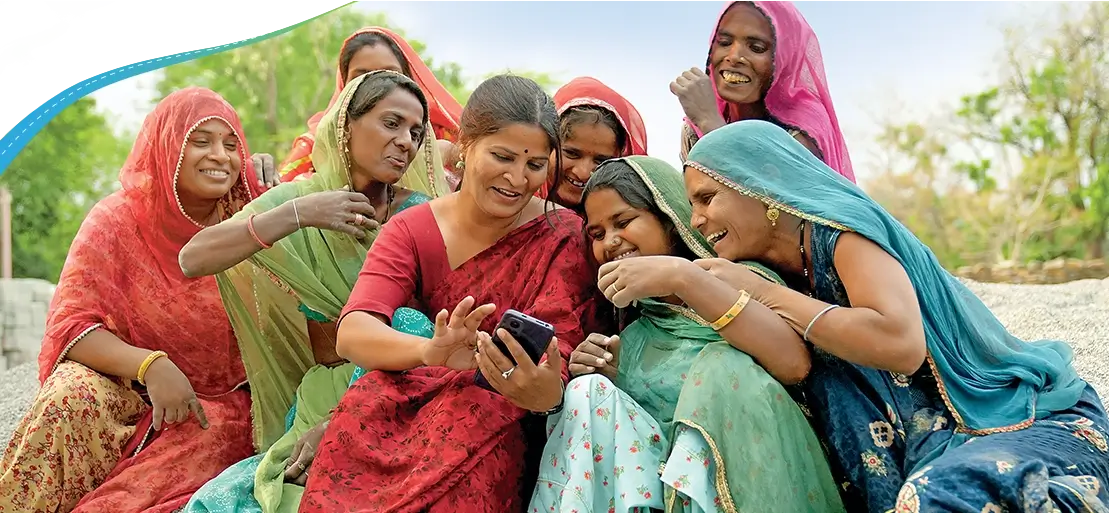Social – Corporate Social ResponsibilityInvesting in Overall Community Development
CSR Vertical 2
Empowering Women through Grassroot Institutions
Women’s empowerment is integral to the nation’s progress and an important engine of long-term sustainable development.
We have thus prioritised women’s empowerment as a pillar of our CSR strategy.
Objective
To promote women’s empowerment economically and socially.
Description
Sakhi (derived from Sanskrit, the word ‘Sakhi’ means friend or companion) works towards empowerment of women by making them financially and individually independent through sustainable grassroot institutions like federations, village organisations, self-help groups (SHGs) and microenterprises.
The microenterprises initiative strives to support sustainable livelihoods and empower women from underprivileged areas, to make them change agents of society. It supports and enables women through development of enterprises. It further sustains the microenterprises that are owned and managed by the women members.
Impact
Women benefitted through Sakhi
including the microenterprises initiative
27,000+
Villages and village organisations:
across 7 locations in 6 districts in the states
of Rajasthan and Uttarakhand
200+
Microenterprises developed
12
Heroes of the Vertical
- Uthori – Sensitising sakhis on gender issues, vulnerability, awareness about relevant Government schemes, acts and rights, besides engaging with the participants to recognise gender stereotypes and identify opportunities to overcome barriers. 98 gender sakhis working actively in the field, raised awareness among 22,500+ sakhis
- Hindustan Zinc’s Chairperson Ms. Priya Agarwal Hebbar launched a food brand named DAICHI
Women’s Empowerment Programme Initiatives

Major Activities & Achievements During FY 2022-23
Partnering with Manjari Foundation, Hanuman Van Vikas Samiti, Centre of Values – CosV, CSC Academy, GoIT
Sakhi
- 7 federations across 7 operational areas at Rajasthan & Uttarakhand strengthened to take over and sustain the responsibilities of 2,153 SHGs
- 101 Poshan Sakhis developed, reaching 21,695 women in adopting a healthy lifestyle by eradicating anaemia and leading to healthy mothers and healthy families
- 12 Sakhi Sewa Kendras to improve digital literacy amongst rural women by providing services to access Government schemes besides other services like online paying of bills and filling up forms; 1,500+ digital transactions amounting to
₹ 37+ lakhs
- 32 Suraksha Sakhis part of the security campaign in collaboration with Rajasthan Police
- 1,500+ women trained under skill development and entrepreneurship
- Family Based Livelihood Programme – Loans worth ₹ 4.87 crore disbursed among 1,400+ SHGs to support livelihood opportunities
Savings achieved by SHG
₹ 15.48 crore
Cumulative loans generated
₹ 76.92 crore
Credit generated
₹ 13.23 crore
Women who successfully started individual
microenterprises
1,402
Microenterprises
- 12 production units run by women, 290 women engaged in manufacturing and sale of products
- 2 brands established Upaya (Apparels), Daichi (Food)
- 10 store-in-store/sakhi haats established
- Heart with Fingers (HWF), an umbrella marketing body, in progress
- Hike in sales from business sakhis, ranging from
₹ 30,000 - ₹ 40,000 to ₹ 6 lakhs per month achieved by boosting rural marketing through Grameen Sakhi Haats
- ₹ 1.51 crore convergence through partnership with PNB Housing, NABARD, Capri Global
Revenue generated through microenterprises
₹ 1.29 crore
Total income of sakhis in production
₹ 33.37 lakhs
Sales achieved by business sakhis
₹ 43.73 lakhs

Our microenterprises initiative for women’s empowerment started with women forming individual microenterprises, ranging from beauty parlours and tailoring units to general stores and wheat mills. The success of these individual ventures motivated women to form collective enterprises, running production units for pickles, spices and pulses. Women who had undergone training in sewing and stitching went on to open tailoring units, which initially took up orders for children’s uniforms from the Anganwadis and later signed an MoU with the CSC Academy for stitching the uniforms and providing textiles for their online stores. Growing from success to success, these microenterprises eventually launched their own textile brand ‘Upaya’ and food brand ‘Daichi’. In another innovative initiative, the women started using smelter remains as raw material to convert them into aesthetically pleasing paver blocks, which were sold to various residential colonies and schools for the construction of footpaths.
SAVE LESSSAVE MORE

